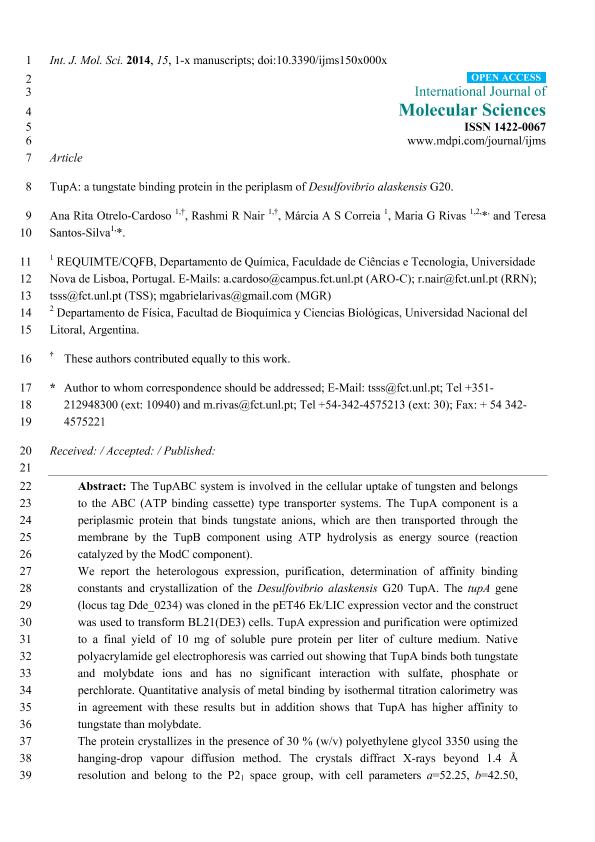Artículo
TupA: A tungstate binding protein in the periplasm of Desulfovibrio alaskensis G20
Otrelo Cardoso, Ana Rita; Nair, Rashmi; Correia, Márcia; Rivas, Maria Gabriela ; Santos Silva, Teresa
; Santos Silva, Teresa
 ; Santos Silva, Teresa
; Santos Silva, Teresa
Fecha de publicación:
07/2014
Editorial:
MDPI AG
Revista:
International Journal of Molecular Sciences
ISSN:
1422-0067
Idioma:
Inglés
Tipo de recurso:
Artículo publicado
Clasificación temática:
Resumen
The TupABC system is involved in the cellular uptake of tungsten and belongs to the ABC (ATP binding cassette)-type transporter systems. The TupA component is a periplasmic protein that binds tungstate anions, which are then transported through the membrane by the TupB component using ATP hydrolysis as the energy source (the reaction catalyzed by the ModC component). We report the heterologous expression, purification, determination of affinity binding constants and crystallization of the Desulfovibrio alaskensis G20 TupA. The tupA gene (locus tag Dde_0234) was cloned in the pET46 Enterokinase/Ligation-Independent Cloning (LIC) expression vector, and the construct was used to transform BL21 (DE3) cells. TupA expression and purification were optimized to a final yield of 10 mg of soluble pure protein per liter of culture medium. Native polyacrylamide gel electrophoresis was carried out showing that TupA binds both tungstate and molybdate ions and has no significant interaction with sulfate, phosphate or perchlorate. Quantitative analysis of metal binding by isothermal titration calorimetry was in agreement with these results, but in addition, shows that TupA has higher affinity to tungstate than molybdate. The protein crystallizes in the presence of 30% (w/v) polyethylene glycol 3350 using the hanging-drop vapor diffusion method. The crystals diffract X-rays beyond 1.4 Å resolution and belong to the P21 space group, with cell parameters a = 52.25 Å, b = 42.50 Å, c = 54.71 Å, β = 95.43°. A molecular replacement solution was found, and the structure is currently under refinement.
Archivos asociados
Licencia
Identificadores
Colecciones
Articulos(CCT - SANTA FE)
Articulos de CTRO.CIENTIFICO TECNOL.CONICET - SANTA FE
Articulos de CTRO.CIENTIFICO TECNOL.CONICET - SANTA FE
Citación
Otrelo Cardoso, Ana Rita; Nair, Rashmi; Correia, Márcia; Rivas, Maria Gabriela; Santos Silva, Teresa; TupA: A tungstate binding protein in the periplasm of Desulfovibrio alaskensis G20; MDPI AG; International Journal of Molecular Sciences; 15; 7; 7-2014; 11783-11798
Compartir
Altmétricas



